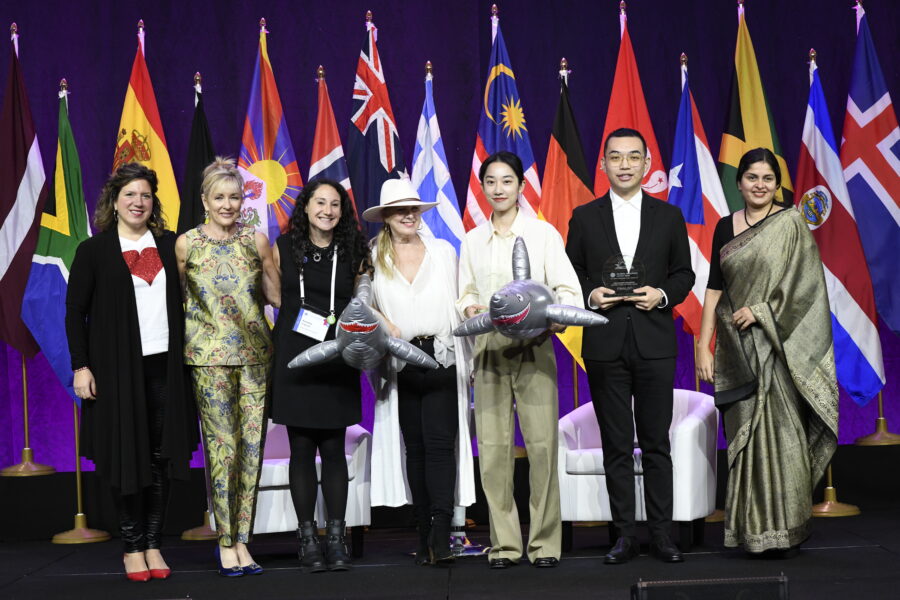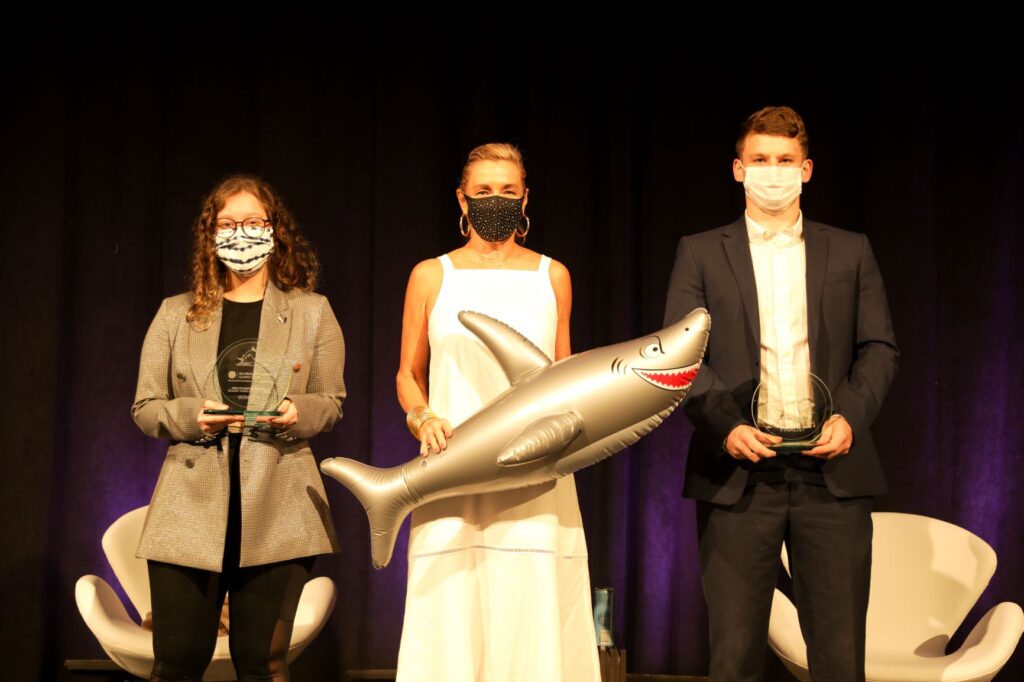“Shark Tank of Wellness”
Student Global Competition
The “Shark Tank of Wellness” student global competition is a unique global challenge in which university students have the opportunity to submit their most innovative, impactful idea for the wellness industry.
We define the wellness industry broadly and are looking for innovations in sectors as varied as architecture/design, beauty, education, fitness, hospitality, investment, medicine, nutrition, real estate, spa, technology, travel, tourism, and more.
Submissions take the form of a written application as well as a short one to two minute video presentation of the idea. The top three finalists are flown to the location of the annual Global Wellness Summit to defend their ideas to the Wellness Sharks for a chance to win their share of $10,000.
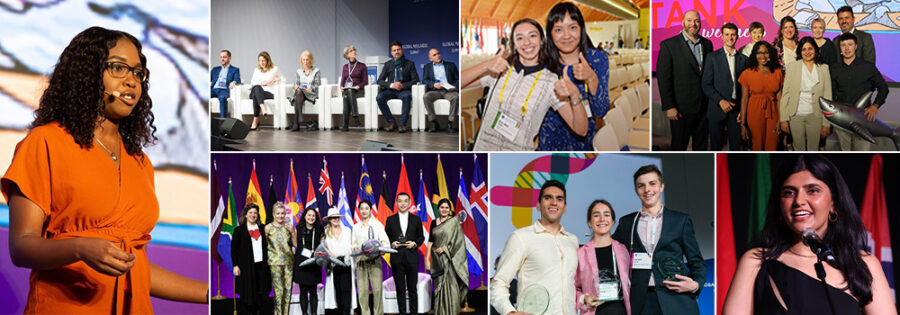
Past Finalists & Winners
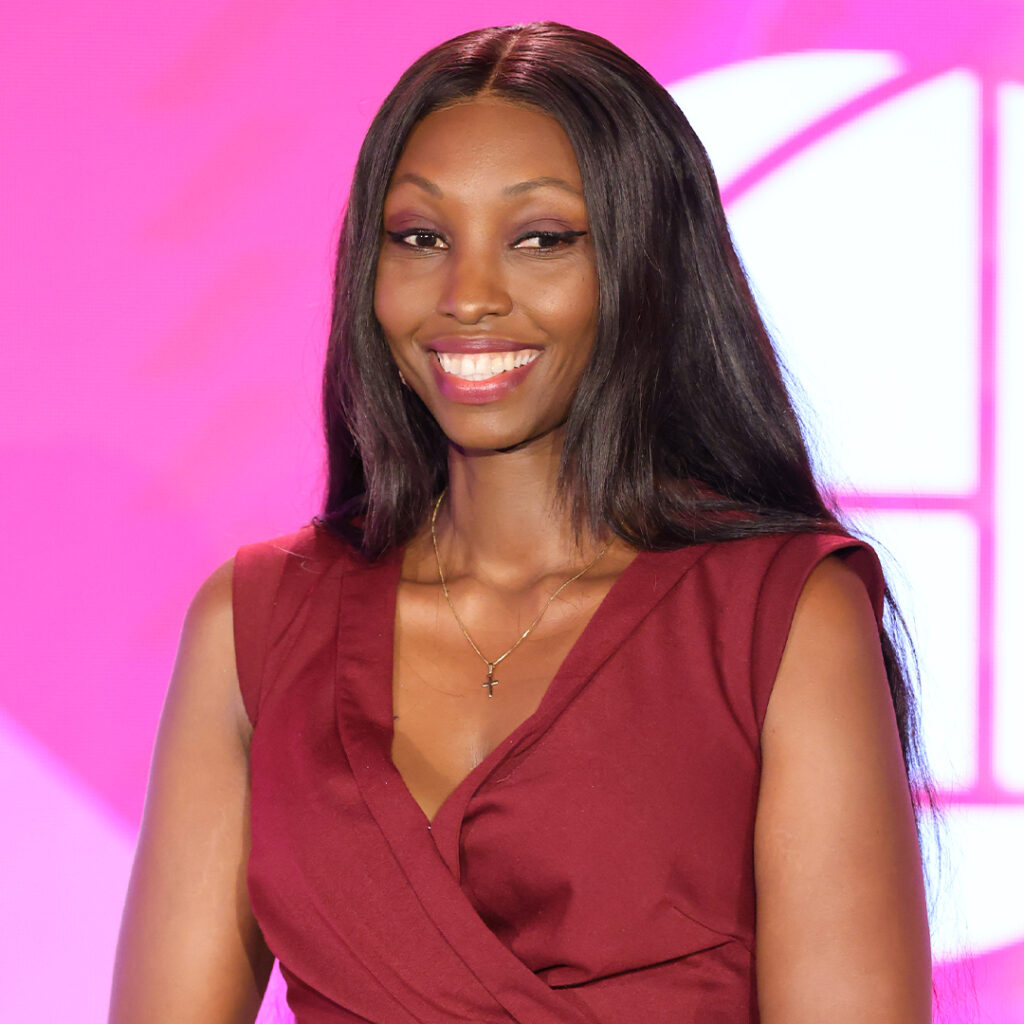
2023 | Miami, Florida, USA
Judith Nduati, Edinburgh Business School, United Kingdom
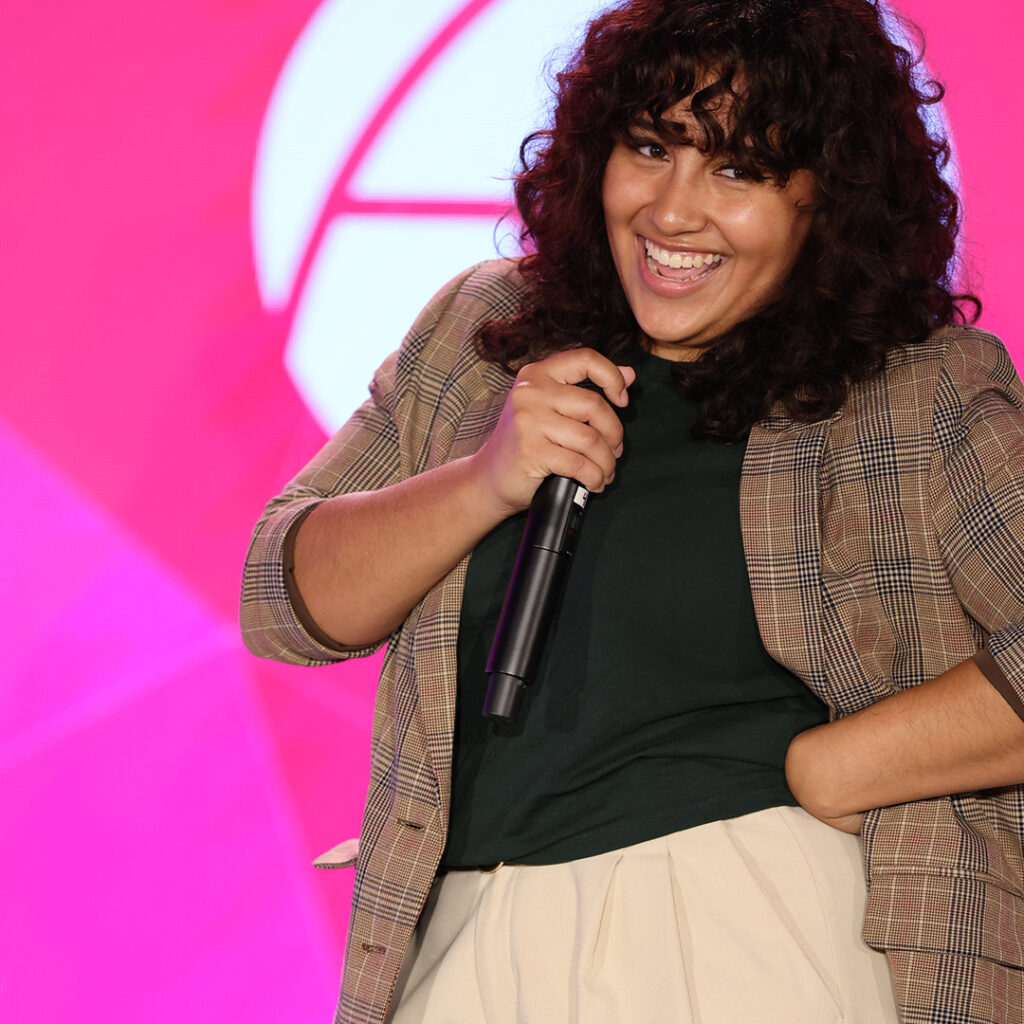
Sydney DeVilla, Savannah College of Art and Design, United States
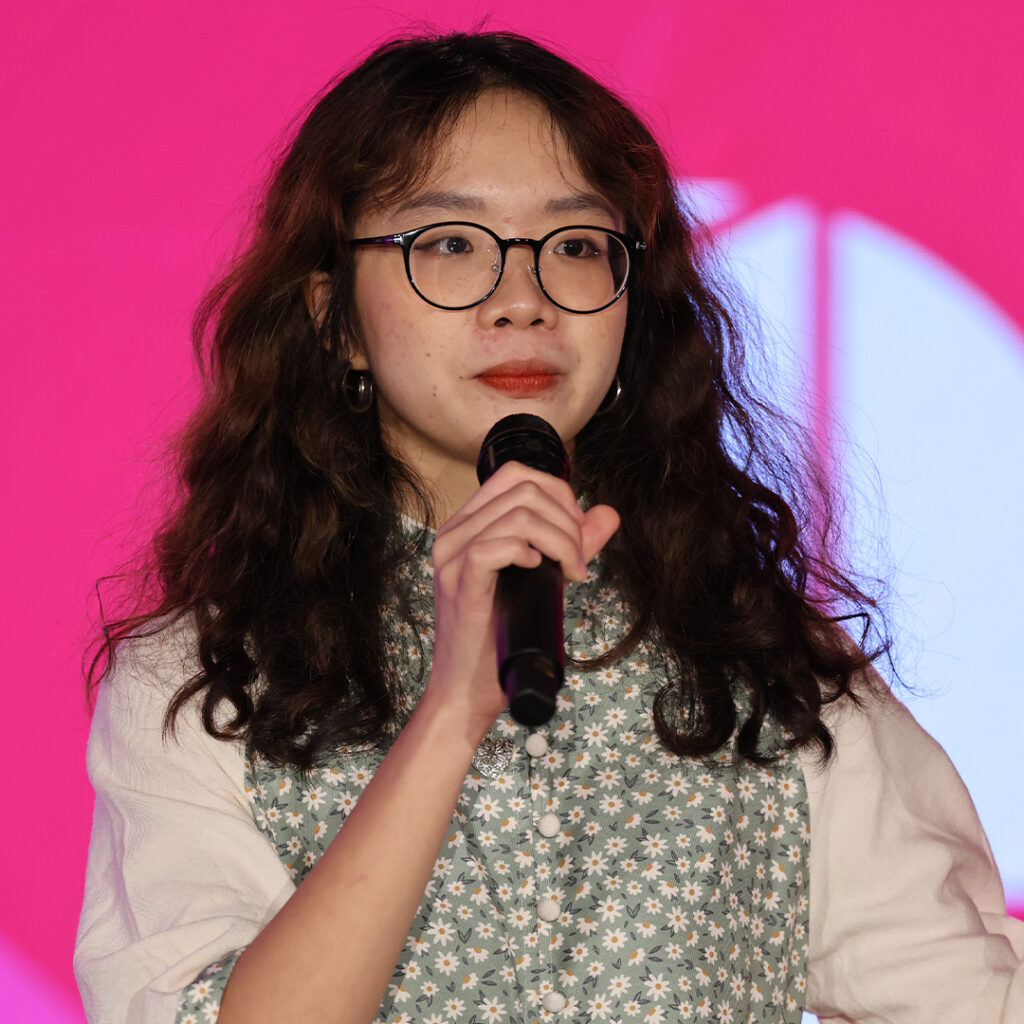
Annie Pham Quynh, Fulbright University, Vietnam
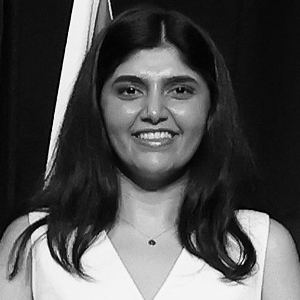
2022 | Tel Aviv, Israel
Anvisha Vora, from Atlanta, Georgia’s Savannah College of Art and Design, took first place honors ($5,000) for Heare, a portable wand that uses micro-vibrations on targeted areas of the ear to manage mental well-being and stimulates the parasympathetic nervous system. A problem-solver with an eye for design, Vora is an international graduate student from Mumbai, India, pursuing a Master’s in Advertising.
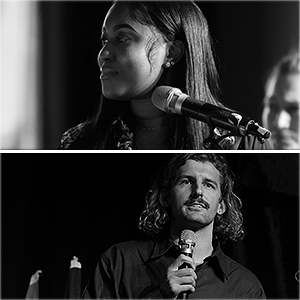
Kay McCalla, also from the Savannah College of Art and Design, took second place honors ($3,000) with Aurb, an energetic art piece designed to elevate meditation with color therapy and healing crystals; while third place ($2,000) went to Cornell University’s David Austin Jones for Sol Sauna, a floating sauna business concept that will bring a true sauna experience to urban hotspots and natural settings across the United States.
2021 | The Encore Boston Harbor
First prize went to Linxin Lu, from Atlanta, Georgia’s Savannah College of Art and Design, took first place honors for Sveet, a portable saliva test for blood sugar designed in the shape of a fortune cookie for diabetic youth. Linxin was supported by Gauri Misra-Deshpande, Professor of Advertising at the Savannah College of Art and Design. (Received US$5,000)
The first runner-up was Rui Wang, also from Savannah College of Art and Design, who presented Sora, a sleep skylight designed to help with circadian health. (Received US$2,500)
The second runner-up was Doan Anh Duong, from Korea’s Dongseo University, whose Immersion Lamp seeks to bring transformative multimedia experiences, including sound, aroma and visuals, to help transport users to spaces of wellness from wherever they may be. (Received $2,500)
The Shark Tank of Wellness awards were presented by Frank Pitsikalis, founder and CEO of ResortSuite (Canada), and fellow judges Amir Alroy, co-founder of Welltech Ventures (Israel), Karen Ballou, founder & CEO of Immunocologie Skincare (US) and Mia Kyricos, Chief Love Officer of Kyricos & Associates (US).
2020 | The Breakers Palm Beach, Florida
First prize went to Krysta Silva, from Atlanta, Georgia’s Savannah College of Art and Design, took first place honors for her allergy sensing fork, Samii. Silva’s innovation uses nanotechnology and the cellulose nanocrystals inside the fork to attract the allergenic proteins and detect them. The app then notifies the user that the food is not safe to eat, saving time, money, and a potential trip to the emergency room. (Received US$5,000)
First runner-up was Balazs Csatlos, from Hungary’s University of Pannonia, for the Sleeping Beauty sleep mask, a new high-tech solution for getting a good night’s sleep. (Received US$3,000)
Second runner-up ($2,500) was Liam James Campbell from the Savannah College of Art and Design, for Melo, a multifunctional pregnancy pillow to enhance sleep/rest. (Received US$2,000)
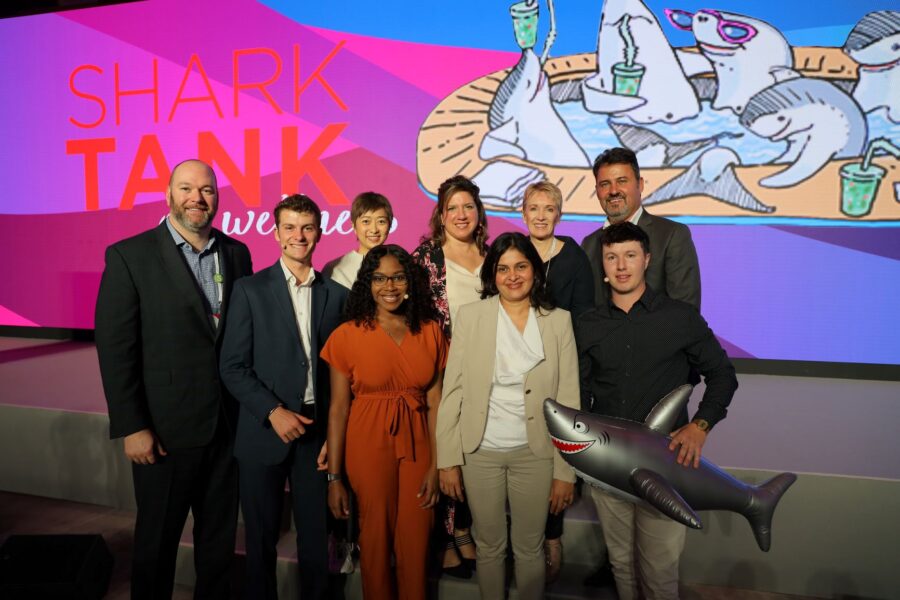
2019 | Grand Hyatt Singapore
First prize went to Jazmin Darling at Savannah College of Art and Design for her WEL organic organizers which are designed to increase the longevity of fresh produce while stimulating healthy eating habits through visualization. The WEL’s sleek design is perfect for Wellness Kitchens of the future and will fit an average-size kitchen counter to display, store and cool fruits and vegetables. Not only will it extend the longevity of produce, it’s also customizable and sustainable. (Received US$5,000)
First runner-up was Matthew Payne at Savannah College of Art and Design for the RU Wellness Straw. This reusable straw comes with biodegradable flavor capsules enhanced with flavors that encourage users to stay hydrated by drinking eight glasses of water each day. (Received US$3,000)
Second runner-up ($2,500) was Simon Lewis at Savannah College of Art and Design for Enfuze Home Goods, a product that infuses the stress-relieving benefits of cannabidiol (CBD) into the home and clothing through an additive that is used while washing laundry, a calming linen spray and a set of wool dryer balls. (Received US$2,000)
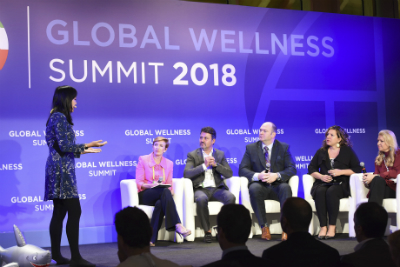
2018 | Technogym, Cesena, Italy
1st Place Winner: Maria Mu of Cornell University for her sleep technology concept, Bellumo, aimed at helping hundreds of millions of people worldwide that have trouble falling asleep at night. An alternative to potentially harmful medications, Bellumo is a glowing, hanging mobile that guides users through breathing exercises to help them fall into sleep. The form of the mobile was inspired by the bioluminescence of jellyfish and their elegant pulsating shapes, and the glowing and dimming of the soft LED lights guides users to inhale and exhale for set amounts of time, helping them relax deeply (received $5,000).
First runner-up: Ece Nur Temel from Istanbul Technical University for her concept Yoga Lounge, a personal yoga space (or pod) designed for use throughout airports. With over 560,000 flights delayed a month, Yoga Lounge provides a private yoga/meditation sanctuary in the extremely stressful airport environment. Each module is divided into two small areas: one where you place baggage and change your clothes, the other a circular area for doing yoga or meditation, with yoga essentials such as blocks, straps, etc. Yoga Lounge is also a chill-out option for libraries, universities, hospitals, etc (received $2,500).
Second runner-up: Niccolo Saltarelli from Les Roches Global Hospitality Education in Switzerland for his concept CampWell. This innovative health and wellbeing-focused summer camp pairs young adults with experienced camp counselors from an older generation, for immersion in human connection and intergenerational bonding and physical and mental health education and experiences. Programming at CampWell is designed to attack the current epidemic of loneliness and unhappiness among young adults (received $2,500).
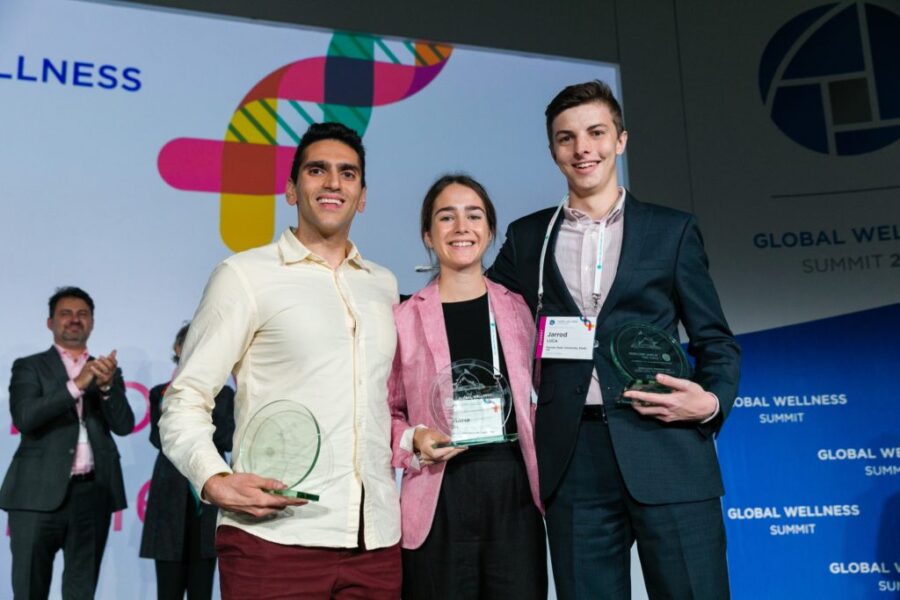
2017 | The Breakers Palm Beach, Florida
1st Place Winner: Jarrod Luca developed an EMDR: Eye Movement Desensitization and Reprocessing, a new therapy used with a virtual reality headset to treat sufferers of Post Traumatic Stress Syndrome (PTSD) and anxiety disorders (received $5,000).
First Runner Up: Maria Gil developed a pHealth toothbrush, which encourages people to a consume a less acidic diet (received $2,500).
Second Runner Up: Mikey Ahdoot developed the Every Damn Day app, which tracks habits, motivates users and matches them with an accountability partner (received $2,500).
READ PRESS RELEASE | VIEW STUDENT PRESENTATIONS
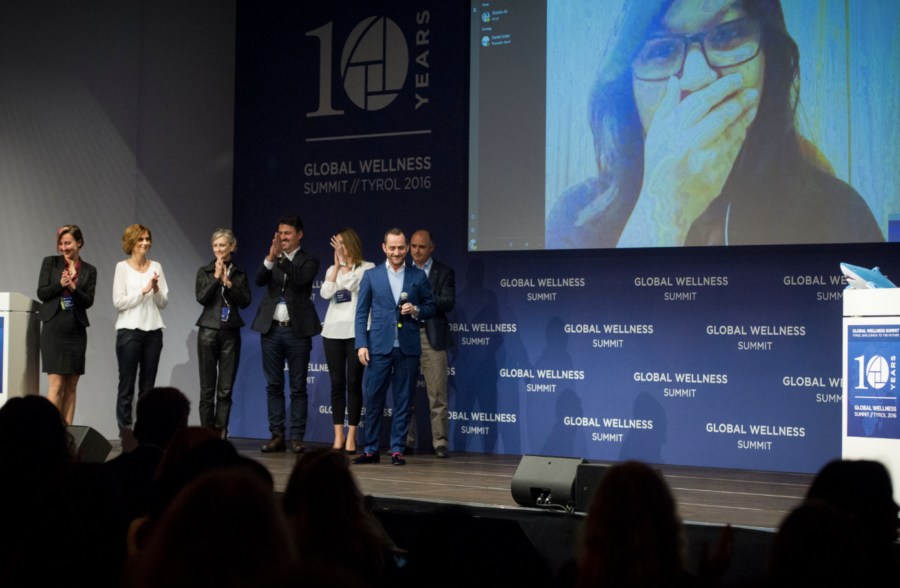
2016 | Kitzbühel, Austria
1st Place Winner: Shahrin Ali with “Mukto Sanitary Napkin” (received $5,000)
2nd Place Winners (tied): Svjetlana Radakovic with “Spa Watch” (received $2,500) and Regina Tarány with “Treat Advisor” (received $2,500)
Former Global Wellness Summit Student Competition
Prior to the launch of the Shark Tank of Wellness student competition in 2016, the Global Wellness Summit, with the help of the famous Ecole hôtelière de Lausanne, launched the first Student Challenge at the third annual Summit that took place in Interlaken, Switzerland, in 2009. Due to its popularity, it quickly became a staple component of each subsequent year’s agenda.
The former Student Challenge was a competition for students in fields of study relevant to the spa and wellness industry. While the logistics of the Student Challenge varied slightly from year to year, the focus was always on developing or designing a spa of the future. Each team of three students worked in conjunction with a professor (faculty advisor) from their school and a professional architect or designer chosen by the Global Wellness Summit.
Former Participants, Winners and Presentations
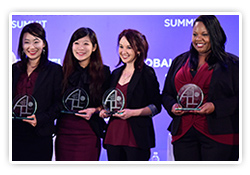
2015 Challenge
Objective: To design a spa resort/wellness concept that is profitable, practical and innovative. It must encompass Latin American Culture and be able to be rolled out globally and must be commercially viable, credible and proven.
1st Place: The University of Nevada Las Vegas with its concept of Ch’ulel Mendoza, a vinotherapy-inspired resort spa (Team members: Gina Marano, I-JuLu, Courtney Marshall and Eun Joo Kim).
2nd Place: Universidad Anáhuac México Norte. Prizes: US$2,000 and a trophy for first place, and US$1.000 for second place.
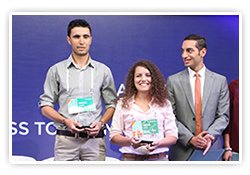
2014 Challenge
Objective: To design a spa resort/wellness concept that is profitable, practical and innovative. It must encompass North African Culture and be able to be rolled out globally and must be commercially viable, credible and proven.
1st Place: Mohammed V University’s Samrae Spa & Salon. (Team members: Hassan Errifai, Aicha Zaimi, Rabiaa Farres and Ayoub Zaimi).
2nd Place: The American University in Cairo.
3rd Place (tied): Al Akhawayn University and ESSEC Business School. Prizes: US$1,000 and a trophy for first place, US$500 for second place, and US$250 for third place.
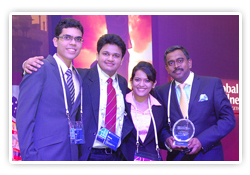
2013 Challenge
Objective: To design a spa of the future that is profitable with a GSWS-assigned architect.
1st Place: Institute of Hotel Management, Aurangabad (IHM-A)’s Spasthya brand,where spas are designed to help people integrate socially, by teaching health, hygiene and practical wellness like healthy cookbooks/cooking classes for the common man (Team members: Shreeya Mahant, Varun Sahgal, Raj Shah).
2nd Place (tied): Indian School of Business, Hyderabad’s The Saartha and University of Delhi, New Delhi’s Sparsh. Prizes: US$1,000 and a trophy for first place, and US$750 for second place.
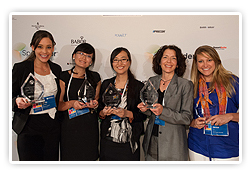
2012 Challenge
Objective: To design a spa of the future that is profitable with a GSWS-assigned architect.
1st Place: University of Denver’s “Defiant!” spa, a spa that rejects the typical “pampering-patronizing-pink-and-sparkly-manicure” teen spa model to tackle the emotional, physical and social needs of real girls (Team members: Lian Duan, Molly Tompkins, Jing Wan).
2nd Place: Cornell University’s “mente spa & studio” concept.
3rd Place (tied): Pennsylvania State University and University of Houston. Prizes: US$1,000 and a trophy for first place, US$500 for second place, and US$250 for third place.
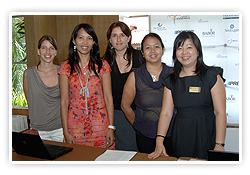
2011 Challenge
Objective: To design a spa of the future that is profitable with a GSWS-assigned architect.
1st Place: Hong Kong Polytechnic University’s “Yi Spa,” a franchised, fixed-locale day spa and a mobile spa van that travels (team members: Tommy Gu, Kitsun Lau, Joyce Ng and Carol Zhang).
2nd Place: The Chinese University of Hong Kong’s Traditional Chinese Medicine hotel spa concept, “SPArmony.”
3rd Place (tied): Gadjah Mada University (Indonesia) and Cornell Nanyang Institute of Hospitality Management (Singapore). Prizes: US$1,000 and a trophy for first place, US$500 for second place, and US$250 for third place.
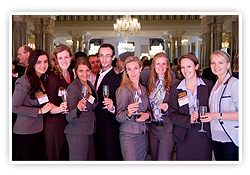
2010 Challenge
Objective: To design a spa of the future that is innovative, environmentally and culturally aware in the historic thermal springs of Kulu, Turkey.
1st Place: Samuel Pitnick, University of Southern California, developed an in-town cultural spa and bathing center and a luxury destination spa situated on an extinct volcano.
2nd Place: Nazim Kahraman, Istanbul Technical University, imagined a 20-room spa hotel/healing center focused on the free play between the inside and outside settings.
3rd Place: Natalie Shull, University of Southern California, designed an agri-tourism spa and culinary school situated on a dramatic plateau between Kulu and the geothermal park. Prizes: US$1,000 and a trophy for first place, US$500 for second place, and US$250 for third place.
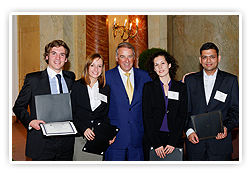
2009 Challenge
Objective: To design a spa of the future for the 21- to 30-year-old demographic.
1st Place: Institut de Management International’s deeply social spa vision “Chill House Lounge & Spa.”
Runner Up: Ecole hôtelière de Lausanne’s college campus-integrated spa, “Spa4U.” Prize: Each member of the winning team from IMHI received a certificate for free registration to a future Summit (valued at US$2,290 per student).

